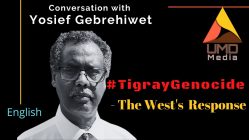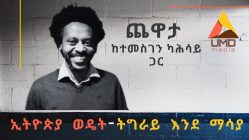Yohannes Aberra (PhD)
July 24, 2024
In nature, causality is the driving force behind almost all changes in the universe. Since humanity first inhabited the planet, people have questioned why things change. For example, why do day and night follow each other? One might ask: Is day causing night or vice versa? It is now common knowledge that a third cause—the Earth’s rotation—results in the regular alternation of day and night. All scientific inquiries or investigations essentially seek to understand what causes what or the effects driven by a particular cause or a set of interrelated causes.
The Aftermath of the War
After paying an extremely high cost in terms of human lives and the destruction of social and economic infrastructure, the people of Tigray find themselves in a peace that isn’t fully realized. For the people of Tigray, who have recently emerged from a devastating war, it is difficult to distinguish peace from war. Except for the resumption of basic services (which should be rights rather than privileges of citizens) and the cessation of gunfire, Tigray still faces widespread social, economic, and political problems. The provisional government, empowered by the so-called “Pretoria Agreement,” is expected to address these issues as quickly as possible. Tigray is now in the second year following the “Pretoria Agreement.”
Internal Struggles Among Tigrayan Leaders
Throughout the past year and a half, there has been intense infighting among the leaders of the resistance. While the people suffered from uncertainty about the return of internally displaced persons (IDPs) and refugees, secure food sources, medical services, and education for their children, as youth unemployment overwhelmed Tigray, and various crimes became rampant, political leaders were engaged in endless mutual accusations. As death and displacement continued in the occupied territories and the future of Tigray as a nation of brave people became unpredictable, these leaders were caught in a power struggle reminiscent of “two bald men fighting over a comb.” By the time one of them succeeds in grabbing the comb, there may be no hair left to comb. Similarly, if one of the disputing political groups in Tigray emerges “victorious,” there might be no Tigray left to govern.
The TPLF’s Role and Public Sentiment
Despite the significant mistakes made by the Tigray People’s Liberation Front (TPLF), which led to the destructive war, and despite the fact that the TPLF’s 17-year armed struggle aimed to liberate the people of Tigray from age-old misery—only to later become a vehicle for self-enrichment—most Tigrayans, both at home and abroad, supported the resistance. They paid dearly with their lives, honor, money, and limbs. It is now clear that the TPLF used the people of Tigray and the diaspora as pawns in a political rivalry with the central government. The sacrifices made by the people during and after the war are seen as an obligation to their “master”: the TPLF. This manipulation by the TPLF mirrors the actions of the nobility in Tigray a century ago during the feudal era, although the latter happened during a time without pretenses of democracy.
TPLF’s Governance and Public Manipulation
The TPLF’s perception of the people of Tigray has been obscured, but it is now clear that the party’s intentions were to keep the population ignorant of democracy and good governance, molding them into obedient followers. For years, the TPLF did not prepare the people for a democratic and prosperous future. Instead, they created a populace conditioned to servitude, analogous to teaching a dog not to bark when mistreated. The TPLF’s goal appears to have been to leave the people economically vulnerable and politically manipulated, much like brainwashed slaves worshipping their masters.
Despite its failures, the TPLF remains in the hearts and minds of millions due to emotional ties and systematic propaganda. Many people who participated in the 17-year armed struggle have strong emotional connections to the TPLF. Additionally, familial and regional connections to the TPLF leadership have economically and politically benefited many. As a result, the TPLF continues to wield significant influence, with many viewing the party as their only hope for political survival.
The Need for Democratic Reform and The Danger of Complacency
The TPLF must stop claiming to be the sole representative of the people of Tigray. Political monopoly is as harmful as economic monopoly. The TPLF should collaborate with other political figures, civil groups, and parties to create a democratic state where key decisions are made by a Supreme People’s Council, not the TPLF Central Committee. The party must work towards preparing Tigray for elections where all candidates have an equal chance.
There is a critical question: “Where is Tigray heading?” While many express dissatisfaction with the TPLF, simply criticizing the party is not enough. Activists, politicians, and ordinary people must focus on resolving current issues rather than dwelling on past victories. Relying on social media alone is insufficient; there must be concrete actions and decisions made collectively. The situation in Tigray bears a concerning resemblance to historical instances where great civilizations, such as the Roman Empire and the Vikings, crumbled due to internal strife.
Tigrayans must overcome hypocrisy and take responsibility for their future. It is not enough to express pride in one’s heritage while ignoring the struggles of fellow citizens. There is a need for genuine commitment to improving the living conditions of the people of Tigray, addressing issues of poverty, education, and healthcare. The TPLF must recognize that its survival depends on the well-being of the people and work towards inclusive and democratic governance.
Editor’s Note: The opinions expressed in the articles published on UMD Media are solely those of the individual authors and do not necessarily reflect the views or opinions of the editorial team or UMD Media as an organization. The publication of any opinion piece does not imply endorsement or agreement by UMD Media. Readers are encouraged to critically evaluate the content and form their own conclusions. Leave your comments below. Send us your thoughts and reflections to umd.media.2020 at gmail dot com.
Guidelines for contributors All contributions and comments submitted to UMD Media must adhere to the following guidelines. Respectful Language: Avoid using ethnic adjectives that generalize or portray an entire ethnic group in a negative light. Such language is harmful, divisive, and contrary to our commitment to fostering a respectful and inclusive environment. No Incitement: Content that incites hatred, violence, or discrimination against any individual or group based on ethnicity, race, religion, etc will not be tolerated. Constructive Dialogue: We encourage constructive dialogue and the sharing of diverse perspectives. However, it is essential to express opinions in a manner that respects the dignity and humanity of all individuals and groups. Moderation and Enforcement: Our editorial team reserves the right to moderate and, if necessary, remove any content that violates these guidelines. Repeat offenders may be subject to account suspension or banning. By contributing to our platform, you agree to abide by these guidelines and help us maintain a respectful and inclusive community.
Subscribe to UMD Media channel. Join UMD Media Telegram Channel: https://t.me/UMDMedia



